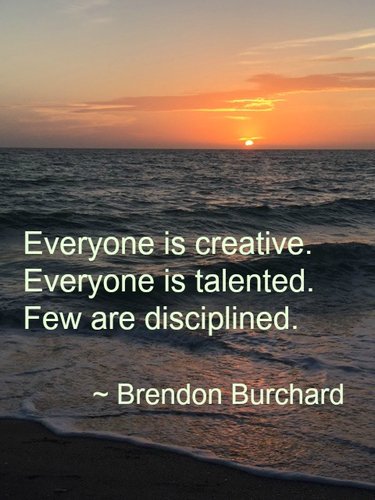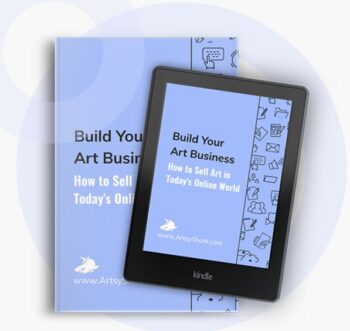by Carolyn Edlund
Why do some artists seem to make it in business, while most others fall behind? It’s not about talent or ability, or desire.

In my experience speaking and working with many artists over the years, I’ve noticed some clear distinctions between the people who rise above, and make a successful business out of their dreams, and the people who don’t. It’s actually not hard to spot those artists who have the best chances of realizing their dreams.
Talent is not a predictor of success. You may be amazingly talented, but that doesn’t mean that you have the drive or ability to create a sustainable business using your talent. What does make the difference?
First, it takes vision. How do you see your life when you are living your dream? How will you be earning your income through your art? What does your business model look like, and what will your daily activities be?
When you have a finely tuned vision in mind, you are in a position to work backwards to plan and set long and short term goals to achieve on your journey. Without a destination in mind, you cannot create a roadmap.
Knowing what you want also puts you in a position to say “no” to those things that take you off course. Does that offer to teach a summer course in painting provide income, but not support your plan to do intensive studio work during the same period? Artists who don’t have a definite plan often end up taking what comes along, and it doesn’t always fit well with what they really want.
Then there is the hard day-to-day work that must take place to succeed. Success doesn’t happen overnight. It happens slowly and purposefully. This requires discipline, and it must be self-motivated. No one cares as much about your creative business as you do.
Individuals who thrive as self-employed artists are disciplined, many times to the point of devotion. They do what they do because they love it. Building that small business sustains them. They delight in and celebrate every small victory, every step forward along the way.
Sometimes artists get hung up on everything having to be perfect before they launch their business, causing long delays that may sabotage their plans. But perfection isn’t necessary. Jump in and get started. Every business is a work in progress, and there is a lot of “on the job learning” to be done.
Staying on course may be easier with an accountability partner or a mentor. Many times when I work with an artist, we create “next steps” to move their business forward, and I usually get an email from them within a few days listing what they have accomplished. Setting achievable goals in small steps that can be checked off helps to keep you motivated, as you see the results of your efforts.
One of the biggest challenges that artists face is following up on leads and prospective clients. Has this happened to you? It’s also one of the biggest hurdles for professional salespeople too – you are not alone. If you need to get back on track with regular contact and activities to close the sale, start where you are and create a plan. Regular email marketing campaigns are excellent strategies to stay in front of people who are either collectors or have expressed interest in your art.
Watching artists give up can be heartbreaking. I’ve spoken to people who worked very hard for months, enduring rejections and difficulties, and rising to challenges, and then they stop. They lose the energy and the passion, and take the easier path. But giving up is another term for choosing to fail.
Persistence is one of your most valuable assets. Simply hanging in there can be more powerful than almost anything else. Show up and be seen. Let people know that you are in it for the long run, and stay the course. You have the ability through motivation and discipline to direct your own future.


Thank you for sharing this! It comes right when its needed and really encouraging to Artists. Thanks for being this inspiration!
Thanks for your comment! I look for daily inspiration myself, and love to pass this on. I’m glad it resonated at the right time.
Thank you, I read it at a time I was totally frustrated and all my efforts and devotion seemed pointless. ‘Talent is not a predictor of success’ funnily enough is what sent me into a slump. I was almost crawling up the wall tearing my hair out after paying for some advertising and of so many people saying how talented I was, yet not one single sale, not even an art card. Reading this has put it all back in perspective. Ha ha, onwards and upwards, I have my goal and yes sometimes it seems a lot easier to go back to my day job, but goodness it doesn’t give me the ZING I feel when working on my art. Life is short, thank you again for keeping me on track.
Thank you for your kind reply, Samantha. This message isn’t new; it is expressed is so many ways by many people and I think is shared to keep us all going. I find a great deal of inspiration myself from Harvey Mackay, who is a very successful businessman/author/speaker. Just today his newsletter arrived in my inbox, with this bit of wisdom:
Think about one of your goals. It requires consistent effort to push toward that goal. If you are not consistently focused on achieving it, you will likely fall back into old habits or lose interest. Being consistent is the difference between failure and success, as evidenced by these motivational superstars:
The late Jim Rohn, entrepreneur and author, said: “Success is neither magical nor mysterious. Success is the natural consequence of consistently applying basic fundamentals.”
Leadership guru John Maxwell said: “Small disciplines repeated with consistency every day lead to great achievements gained slowly over time.”
While I agree in general despite being disciplined for almost 17 years now I’m barely making any return on my art. This is a simplistic view. It must take more then just hacking away at it otherwise something more should have happened for me.
Absolutely Tara – it takes more than just “hacking away” – you must present a cohesive portfolio with a memorable signature style, understand your concept and be able to speak about it, identify your target customer and know what they value – and create marketing messages that emotionally resonate with them.
Selling art is like selling anything in that it takes a lot of effort and planning. And quite frequently successful artists spend literally 50% of their time in marketing if they are serious about selling. That type of persistence and consistent promotion and outreach is necessary.